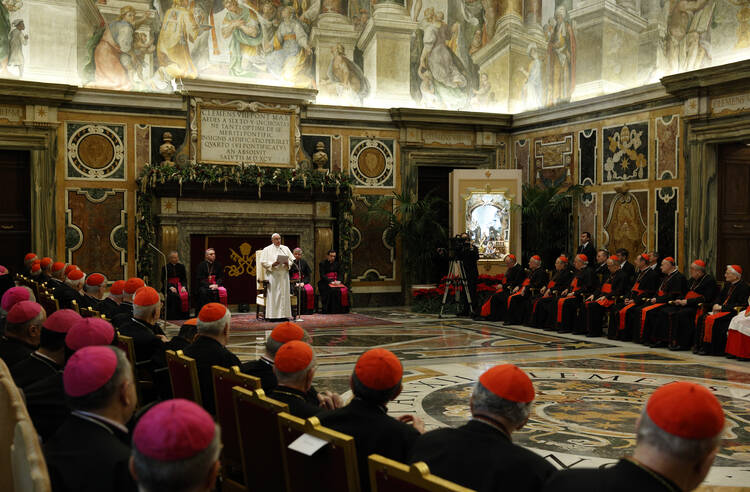Pope Francis' Christmas greeting to the Vatican bureaucracy this year was an extended warning against a host of spiritual ills to which he said Vatican officials are prone, including "spiritual Alzheimer's," "existential schizophrenia," publicity-seeking, the "terrorism of gossip" and even a poor sense of humor.
The pope made his remarks Dec. 22, in a biting half-hour speech to heads of the Roman Curia, the church's central administration, and to cardinals resident in Rome.
Popes have often used their annual Christmas speech to review events of the previous year and lay out priorities for the next. Pope Francis' nine-member Council of Cardinals is currently working on an overhaul of the Curia, but the pope's speech did not address specific reforms. Instead, he spoke in general terms of virtues and values, saying he hoped his words might serve officials as a "support and stimulus to a true examination of conscience" in preparation for the sacrament of reconciliation.
The pope, who has made criticism of the church's leaders a common theme of his preaching, called the Curia a "dynamic body" naturally vulnerable to "maladies, to dysfunction, to infirmities."
He offered what he called a "catalog" of 15 such diseases. Most corresponded to vices for which he has frequently rebuked the hierarchy, including self-promotion, greed and a focus on bureaucratic efficiency over pastoral solicitude. But the pope's rhetoric this time was especially impassioned and forceful.
Following a year in which Vatican officials and other bishops aired differences to a remarkable degree in the press, especially during the October Synod of Bishops on the family, Pope Francis warned against "exhibitionism," the "malady of persons who seek insatiably to increase their power and to that end are capable of calumniating, defaming and discrediting others, even in newspapers and magazines."
The pope denounced the "hypocrisy typical of the mediocre" and said an apostle who puts excessive faith in planning becomes a mere "bookkeeper or accountant" who would "confine and control the liberty of the Holy Spirit." He said an official who forgets his personal relationship with Jesus becomes completely dependent on his "passions, whims and manias," "incapable of carrying out any autonomous activity, living in a state of absolute dependence on his often imaginary views."
Officials who idolize their bosses are "victims of careerism and opportunism," "mean persons, unhappy and inspired only by their own fatal egoism," the pope said, acknowledging that bosses often encourage such attitudes to obtain "submission, loyalty and psychological dependence" from their staff.
Deriding a "gruff and grim" manner he described as characteristic of the insecure, Pope Francis called for a "joyous spirit, full of humor and even self-mockery, that makes us amiable persons, even in difficult situations." The pope said that every day he recites a prayer, which he attributed to St. Thomas More, asking God for a sense of humor.
The pope wound up his remarks on a note of encouragement, saying that the failings of a few have discredited the virtuous majority of the church's ministers. He quoted an adage that "priests are like airplanes, they make news only when they fall, but there are so many that fly."
After the speech in the Vatican's Clementine Hall, the pope spent about half an hour exchanging Christmas greetings with individual cardinals and curial members.








